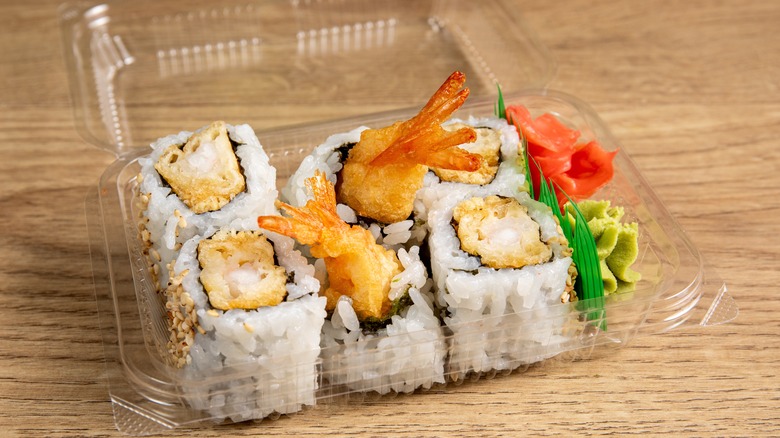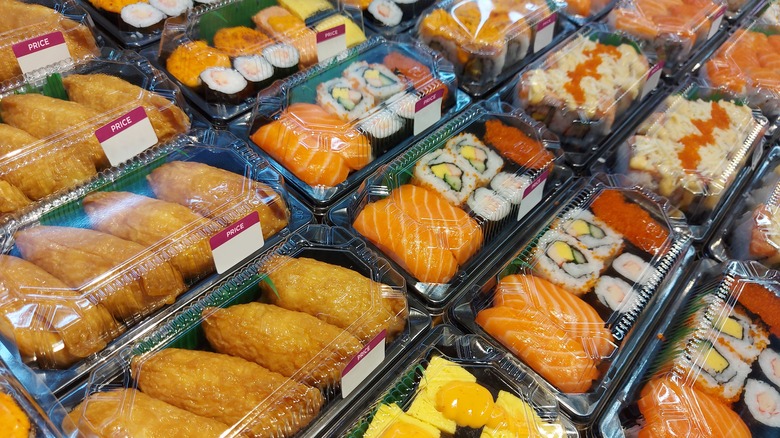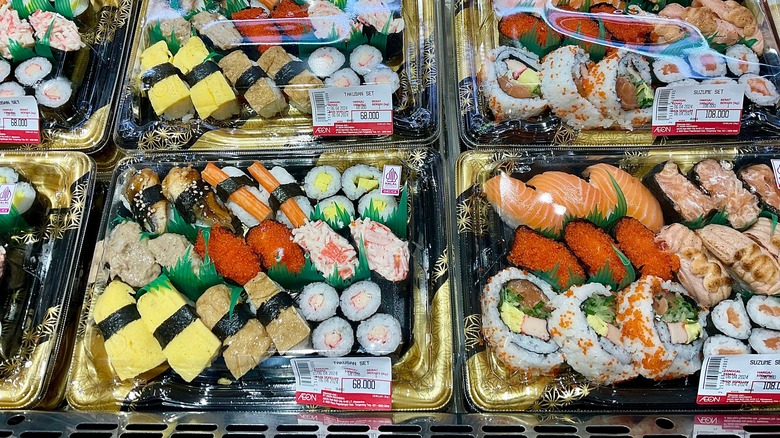Why You Shouldn't Avoid Bargains For Grocery Store Sushi
We've all heard the jokes about supermarket sushi, the looks askance at what is widely viewed as an inferior (if affordable) product compared to something from a quality restaurant. And it's true that grocery store sushi always tastes a little different from the more high-end stuff, with the rice a little off in both taste and texture by comparison and the fish not nearly as flavorful. But it's also true that supermarket sushi is safe to eat – foodborne illness outbreaks are caused far more frequently by vegetables, for example. What about when sushi is marked down, though? We're talking raw fish here, so shouldn't we be worried about the provenance of any grocery store sushi bargain?
Actually, if you're buying sushi from a chain like Kroger or Publix, you shouldn't worry about the food safety of marked-down Philadelphia rolls. It makes sense when you think about it: If grocery stores are going to great enough lengths to make sure their sushi is safe in the first place, why would that care and caution go out the window just so they can move the product if it doesn't sell immediately? In fact, marked-down sushi is typically a price change that exists for products with a shorter life than a mayfly, only appearing for a matter of hours before being thrown out if it hasn't sold.
Major grocery chains don't mess around with food safety
Generally, major chain grocery stores like Kroger or Wegman's will make their sushi for same-day sales. When sushi is marked down, it's typically not because it's days old but because it's later in the day, and they know it will be chucked in the trash when the lights go out that night (or, at the very latest, the next day). The idea is not to entice customers to buy bad food but to buy food before it goes bad — especially since sushi has a shorter shelf-life than many other products. Additionally, sometimes sushi is put on markdown immediately when it hits shelves — like at Sprouts and Publix, which are notable for $5 "Sushi Wednesday" deals.
It shouldn't be surprising that big supermarket chains care about sushi safety when marking down their California rolls. These are companies that have to take food safety seriously; if customers get sick, it opens up the possibility of serious lawsuits and monumentally bad press. Grocery store sushi is already viewed with inherent mistrust, so why risk making that situation worse by taking a chance on whether it'll still be good just so you can make a few extra bucks?
Not all grocery store sushi is rolled equal, though
Although not all grocery store sushi is of equivalent quality, some chains certainly have better offerings than others. While there's no way to scientifically rank grocery store sushi, the key here is to go by reputation, as certain chains have cultivated a positive one relative to competitors. Whole Foods is an unsurprising contender here, even if its sushi can be a bit pricey. In comparison, more affordable chains like Wegman's and Kroger are generally highly regarded — particularly the latter, which is now the single largest retailer of sushi in the U.S. Likewise, Publix has a fantastic reputation and is notable for its sushi deals (which, again, you can trust).
So yes, maybe you do want to cast aspersions on marked-down gas station or airport sushi. But, you should have faith in what you get from a major chain grocery store — even if it's a couple of bucks off.


